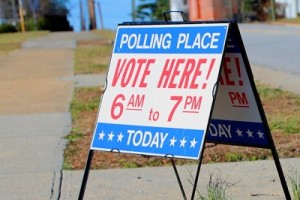Pressing Candidates to Prioritize People with Disabilities: A Voter Checklist
by Randall Rutta, President and CEO
Election season is underway and the American voter is in the driver’s seat, with every candidate’s policies and promises up for review.
In addition to the presidency, 469 seats in the U.S. Congress (34 Senate seats and all 435 House seats) are up for election on Nov. 8. And at the state level, 94 senior elected positions across 22 states will be decided in the fall, in addition to legislature elections in 86 state legislative chambers.
Now is the time for voters to ask the tough questions as they decide who will chart the best course for the future of all Americans.
At the top of every voter check-list should be where the candidates stand on helping key segments of the U.S. population who are facing life-changing circumstances and conditions: adults with disabilities struggling to find and keep employment; veterans making the challenging transition to civilian life; and perhaps one of the most vulnerable groups of all — children in need of early intervention for developmental delays, disabilities or autism.
According to the Centers for Disease Control and Prevention, there are 53 million of us with a disability, whether physical, emotional, social or educational. Chances are, most of us will be touched by disability at some point in our lives – whether it is our own or that of someone we know, love or care for. Put simply, disabilities, whether visible and invisible, are a part of everyday life. According to the United States Census Bureau, there were 19.3 million American veterans as of 2014, 3.8 million of whom have a disability. Easter Seals Dixon Center estimates that 1,000 servicemembers transition to civilian life every day.
Given the right support, every person with a disability and every unemployed (or displaced) veteran can be independent and make valuable contributions to their families, their communities and the economic health of the nation. Ensuring that they get the support they need helps us all.
Here are the key issues on which voters should press their candidates, whether at the federal, state or local level:
- Unemployed adults with disabilities: The economy may be on the upswing, but the unemployment rate for Americans with disabilities is on the rise, reaching 10.8 percent in January, up from 10.3 percent at the close of 2015, according to the U.S. Department of Labor. This is nearly double the rate for the general population. The figures also show that though more people with disabilities were looking for work in January, the number actually employed declined. Americans must seek out leaders who prioritize solutions to the needs of this group, which include adequate public transport so people with disabilities can get to and from jobs, companies that recruit and retain employees with disabilities, and support for caregivers of family members with disabilities.
- Early intervention for children: Some 40 percent of children under the age of 5 years are at risk of a developmental delay or disability. Of those, 26 percent are at moderate to high risk of developmental delay, according to the U.S. Department of Health and Human Services. As many as a million children 5 years or under fail to be identified for intervention, according to Easter Seals. It is now well-established that early intervention — such as occupational, physical and speech therapy — can make an enormous difference to children with delays, minimizing the need for special education and related services when they reach maturity. It can also increase independent living and reduce the need for institutionalization. Congress has recognized this need by creating the Early Intervention Program for Infants and Toddlers with disabilities, which requires states to implement programs. But voters must press candidates to support more comprehensive screening and the funding of these vital intervention services. As the numbers show, we need more screening, not less.
- Veterans with disabilities: Of those who have served since 9/11, nearly three in ten have a disability. Government programs that support our disabled veterans must remain fully funded. So, too, must efforts to find employment for this highly-skilled workforce.
- Unemployed veterans: Whether living with a disability or not, we need leaders to continue programs that have made so much progress in transitioning our veterans into the civilian workforce. And of the younger veterans, women are particularly at risk, with 7.9 percent unemployment. It’s a problem with growing consequence. The U.S. Department of Veterans Affairs (VA) estimates 10 percent of women veterans live in poverty and are the fastest growing segment of the homeless vet population. We need government programs tailored to the needs of these young women, many of whom have children.
- Support for caregivers: Behind every veteran with a disability stands a network of caregivers — spouses, parents, grandparents, and children — who shoulder the care and support of their disabled veteran, which may extend for decades. According to a study by the Rand Corp., some 5.5 million people are caregivers to a former servicemember, saving the U.S. healthcare system just under $14 billion in uncompensated care annually. Of those caring for post-9/11 veterans, many tend to be younger, with children to care for, and many are caring for a veteran with a service-related brain injury. Services and outreach to this vitally important network must remain strong and continue to be expanded with government initiatives and programs.
As voters enter the polling booth this election season, they should reflect on the awesome power of the ballot with its ability to ensure that those with disabilities and those who have sacrificed for the nation are not forgotten.
President John Quincy Adams perhaps said it best: “Always vote on principle, though you may vote alone, and you may cherish the sweetest reflection that your vote is never lost.”
Rutta is president and CEO of Easter Seals.






